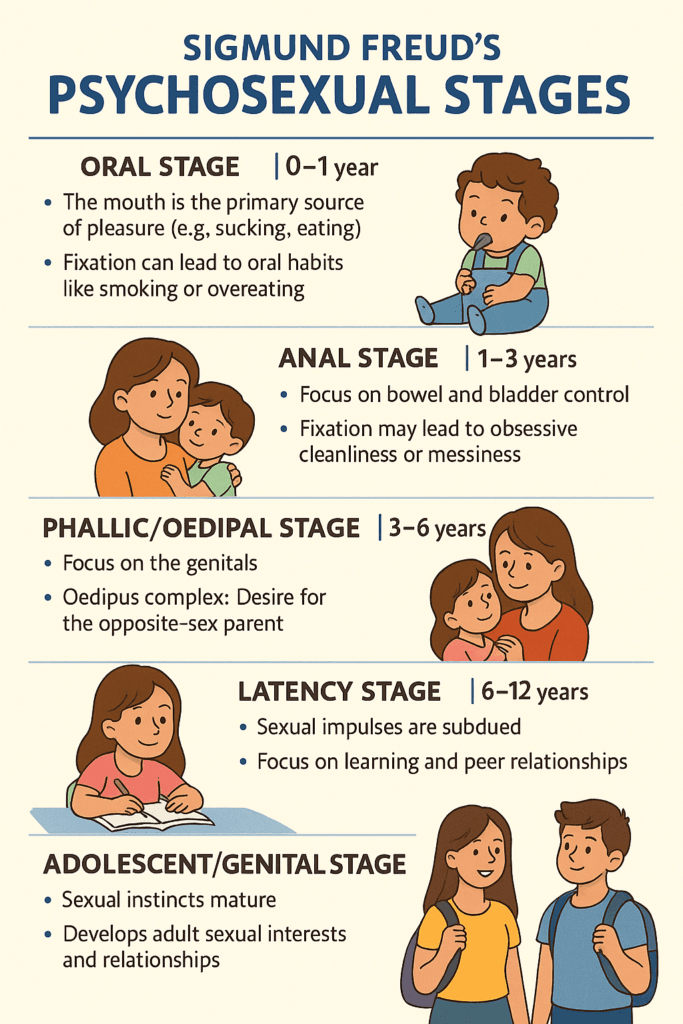Introduction :
Have you ever wondered why some people chew their nails when nervous, or why others are obsessed with cleanliness or control? Sigmund Freud, a famous psychologist, believed that many of our adult behaviors are shaped by how we go through different stages in childhood. These stages are called the psychosexual stages of development.
Freud’s theory might sound complicated at first, but we’ll break it down into simple, easy-to-understand parts, with examples and explanations that make sense even if you’ve never studied psychology.
What Is Freud’s Psychosexual Theory? Freud believed that as children grow, their focus of pleasure changes from one body part to another. Each stage of development is based on this shift in focus, and if something goes wrong during one of these stages, it might affect our behavior as adults.
He identified five stages:
- Oral Stage
- Anal Stage
- Phallic Stage
- Latency Stage
- Genital Stage
Let’s explore each one in a simple and relatable way.
1. Oral Stage (0 to 1 Year)
Main Focus: Mouth – sucking, biting, eating
What Happens:
- Babies explore the world through their mouths.
- They find comfort and pleasure in sucking (thumb, bottle, breast).
Why It Matters:
- This stage is all about trust and comfort.
- If a baby’s needs are met (e.g., being fed and cuddled), they develop a sense of safety.
What If Something Goes Wrong? (Fixation)
- If a baby is overfed or underfed, they might get stuck (“fixated”) in this stage.
Examples in Adults:
- Smoking
- Nail-biting
- Overeating
- Always needing reassurance or being overly dependent on others
Easy Example: Think of someone who always chews pens or snacks when nervous – that might be due to an oral fixation.
2. Anal Stage (1 to 3 Years)
Main Focus: Anus – potty training, control
What Happens:
- Toddlers learn to control their bowels.
- Toilet training becomes a big part of life.
Why It Matters:
- This stage teaches children about rules, control, and independence.
- It’s a power struggle: the child wants control, but parents want discipline.
Fixation Outcomes:
- If toilet training is too strict or too lenient, it can affect personality.
Two Types of Fixation:
- Anal Retentive (strict training): overly tidy, perfectionist, stubborn
- Anal Expulsive (lenient training): messy, careless, rebellious
Easy Example: A person obsessed with cleaning or being “just right” may have gone through harsh toilet training.
3. Phallic Stage (3 to 6 Years)
Main Focus: Genitals – noticing differences between boys and girls
What Happens:
- Children become aware of their bodies.
- They may show curiosity about gender and begin to mimic their parents.
Oedipus and Electra Complex:
- Boys may feel attached to their mother and compete with their father (Oedipus Complex).
- Girls may feel closer to their father and rival their mother (Electra Complex).
Why It Matters:
- This stage is about identity, family roles, and understanding gender.
- The child eventually starts to identify with the same-sex parent, which helps in developing a moral sense (superego).
Fixation Outcomes:
- Problems with identity or relationships later in life
- Arrogance or extreme modesty
Easy Example: A man who is constantly trying to prove himself to other men might be dealing with leftover issues from this stage.
4. Latency Stage (6 to 12 Years)
Main Focus: None (sexual energy is dormant)
What Happens:
- Kids focus on school, friendships, hobbies, and learning new skills.
- They hang out more with same-gender peers.
Why It Matters:
- It’s a time for emotional and social development.
- Children learn teamwork, self-confidence, and how to interact with others.
Fixation Outcomes:
- Freud believed not much goes wrong here, but if a child feels isolated, they might struggle with social skills later.
Easy Example: A shy adult who finds it hard to make friends may not have built strong social bonds in this stage.
5. Genital Stage (12+ Years)
Main Focus: Genitals – but now with mature understanding
What Happens:
- Teenagers develop romantic and sexual feelings.
- They begin to form deeper relationships and understand intimacy.
Why It Matters:
- This is where a person becomes capable of forming healthy adult relationships.
Successful Completion Means:
- You can love, work, and relate to others in a balanced way.
Fixation or Regression:
- If earlier stages weren’t resolved, issues might show up in adult relationships (e.g., fear of intimacy, selfishness).
Easy Example: Someone who avoids serious relationships or struggles with commitment may not have fully matured through this stage.
Final Thoughts: Why Freud Still Matters Even though Freud’s ideas are over 100 years old and often criticized, they still help us understand how early life shapes who we are. His theory reminds us that our childhood experiences can echo throughout our lives, sometimes in surprising ways.
Understanding these stages gives us a window into how people behave and helps us be more aware of our own habits and personalities.
Want to remember it easily? Here’s a quick summary:
